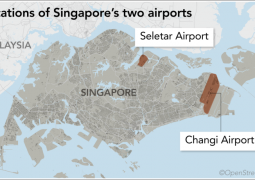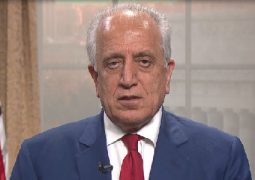U.S. Diplomat: U.S. Must ‘Catch Up’ to China on AI

Here’s what keeps national security experts up at night.

Illustration By Emma McSpadden for USN&WR | Source: Getty Images|AP Images
An image of President Donald Trump is seen before a digital representation of network ribbons.
- China will eventually agree to a deal on trade with the U.S. but can’t just “cave.”
- America’s national security apparatus is not ready for AI.
- When it comes to foreign-owned land in the United States, notably purchases from China, “the devil is in the details.”

Business Wire via AP
Anja Manuel, executive director of the Aspen Strategy Group

These were some of the insights I got on Wednesday from Anja Manuel, a former senior State Department official who is executive director of the Aspen Strategy Group and Aspen Security Forum. The annual forum, which draws national security heavyweights from the U.S. and at least 20 other countries, is set to convene July 15-18.
“We really want to hear from the people that our foreign policy is impacting, rather than all Americans talking to each other,” she says.
This conversation has been lightly edited for length and clarity.

How do you see President Donald Trump’s tariffs fitting in the broader context of U.S. competition with China – and not just as tariffs on China, but on countries that we’re relying on to try to constrain China, like South Korea and Japan?
The U.S.-China competition is the key foreign policy issue of our day. China is not going away, as much as people talk about the Chinese economy slowing down. If you look at Chinese entrepreneurs in the tech sector, there’s been a renewed enthusiasm and openness for the private sector in China.
They are gearing up for a trade conflict with the United States. I don’t think they want this conflict. They want to come to a reasonable accommodation. But they’re not going to just cave. So this is going to be a very difficult negotiation. I can imagine that you end up with some give on the Chinese side on intellectual property, because they’re also innovating, so it’s in their interest. Or perhaps things like access for our financial institutions.
This is going to be a difficult, hard-fought negotiation. Nobody wants a complete rupture, but neither side will get everything at once.

There’s a real push in Congress and in some states to restrict foreign ownership of land, especially ownership by China. Is this a real national security issue? Or is it grandstanding? Or is it both?
All of these national security issues are always really nuanced.
Would I want Chinese ownership of land immediately near our military bases? No. Do I have a problem with the Chinese owning land and property in the United States in general? Absolutely not. So the devil is in the details on all these things, just like the outbound investment restrictions, what we did with CFIUS reform. All of those things are good if they’re not taken too far.

Former President George W. Bush used to ask world leaders what kept them up at night. What topics at the Aspen Security Forum are going to keep us up at night?
AI is one that I already mentioned. We’re doing a really deep dive with multiple panels on AI and technology and how it’s impacting national security from different angles. How will it affect cyber warfare? What is the geopolitics of AI? How are we going to get the most advanced technologies into our national security space?
We have invited, this year, a bunch of smaller, more innovative defense tech companies. This is really a theme that I want to push.
I’m sure you’ve seen the crazy headlines about people impersonating senior U.S. officials, White House Chief of Staff Susie Wiles and now Secretary of State Marco Rubio. Is the United States government, especially its national security apparatus, ready for AI?
That’s the right question to ask. I really don’t think we are. And here just bringing that back to the U.S.-China competition, China has just said that they’re going to teach AI in every classroom, K through 12 and beyond. They are not doing things perfectly, but I think they’re doing better than we are at integrating AI into their military, into their government. And so we really have to catch up.
And this example that you raised of Rubio being impersonated is a perfect example of just one of the many difficulties that’s about to come down the pike that AI is enabling. It’s also going to enable all of these positive things. And I think sometimes Washington is a little too negative.

But on the dark side, at this point, impersonation and deepfakes are a real problem. And then also how AI could potentially intersect with other technologies. Will it make cyberattacks easier? Will it make it easier to build biological or chemical weapons, all of those things, things that we’re just, as a U.S. government, starting to think through.
And boy, we’ve got to speed up that thinking
BY Oliver Knox
- Previous After BRICS summit, Trump Imposes 50% Tariffs on Brazil over Bolsonaro trial: Lula responds
- Next Why the future of AI may be open and turn into Chinese – DeepSeek flash up first in a row

















